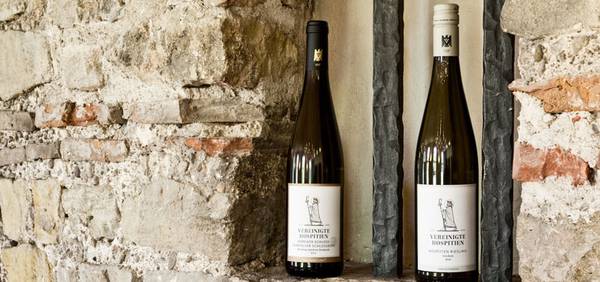The Vereinigte Hospitien looks back on a long tradition of craftsmanship in viticulture. This experience is the foundation of our corporate philosophy. We manage our vineyards close to nature and along organic criteria. The focus is on the treatment of the soil. The rows of vines are naturally green and fertilized only when needed with natural fertilizers, such as straw or manure. We believe in pruning the vines for low yields in winter.
We thus avoid overloading the vines with too many grapes. The quality of the grapes improves and the flavor is more concentrated. During the harvest, the grapes are picked by hand. We sort them according to their level of maturity, which is time consuming and requires a lot of skill.

The focus of our winegrowing philosophy is the treatment of the soil.
We are convinced that the starting point for excellent and distinctive wines can only be based on the singular expression of our vineyards. A large part of our vineyard sites were already classified as “excellent”, the highest quality level, in the first 1868 Prussian vineyard classification.
Year to year, our aim is to make the best possible wine that reflects the typicality of our vineyards, so that the soil in which the vines grow can be tasted.
We use our knowledge and above all our experience to take care of the vines and the peculiarities of each vineyard, including the right time to harvest the grapes. A challenge that inspires us every year anew and simultaneously demands a lot.
Modern technology helps us in the vineyard and in the cellar. It helps us improve the quality of the wines even further. So it is possible for us to give the wine as much time as necessary for development and as little as possible to intervene in the winemaking.
The aim of our work is terroir-typical Mosel wines with moderate alcohol and with a lively character, in which the entire flavor profile from dry (trocken) to off-dry (feinherb) up to fruity and nobly sweet wines.
Let us get you excited about our “love of the soil.”

The GROSSE RING (“large circle”) was established in 1908 on the initiative of the Trier mayor Albert von Bruchhausen. In 1910, Bruchhausen united – which now existed in other German winegrowing regions – similar associations to form the Verband Deutscher Naturweinversteigerer (Association of German Natural Wine Auctioneers) – a precursor of today´s well-known Verband Deutscher Prädikatsweingüter (VDP or “Prädikat Wine Estates”). Today, the Mosel chapter is named GROSSER RING – VDP Mosel-Saar-Ruwer and has 31 members. Among them are names that were also there at the founding. We are particularly proud to belong to this illustrious circle of the best wine producers in the world from the very beginning.
Classification of the VDP
On the Mosel, Saar, and Ruwer, the VDP classification has a tripartite hierarchy: Gutsweine (estate wines), Ortsweine (village wines), and wines from Grosse Lagen (best sites).
Our vineyards come partly from the historic properties of former Trier monasteries. These are all VDP-classified best sites on the Mosel and Saar. Overall, we cultivate 24 hectares of vineyard area, 90 percent of which are planted to Riesling, 10 percent Pinot varieties: Grauer Burgunder (Pinot Gris), Weißer Burgunder (Pinot Blanc), and Spätburgunder (Pinot Noir). Most of the vineyards are steep slate slopes, which entail costly manual labor. We have sole ownership of four single-vineyard sites – an absolute rarity.
-


Vdp.Gutswein -


VDP.ORTSWEIN -


VDP.GROSSE LAGE
-


Vdp.Gutswein -


VDP.ORTSWEIN -


VDP.GROSSE LAGE
A VDP.GUTSWEIN is a good introduction to the quality hierarchy, which is based on a sense of place, of the Prädikat wine estates. The wines come from estate-owned sites that meet the strict quality standards of the VDP.
A VDP.ORTSWEIN comes from high-quality and traditional vineyards full of character. These are designated under the village name. Besides top-quality vineyard sites, regional grape varieties and limited yields are a prerequisite for this type of wine.
A VDP.GROSSE LAGE distinguishes the highest quality of German vineyards. The sites are clearly demarcated by the parcels. The best wines mature with impressive site and aging potential. The wines come from narrowly defined vineyards with the matching varieties. Dry wines from a VDP.GROSSER LAGE are called VDP.GROSSES GEWÄCHS (GG), whereas residually and nobly sweet wines bear a predicate.






